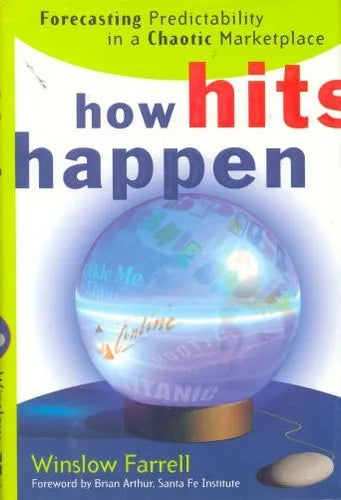LIBRO USADO
How Hits Happen: Forecasting Predictability in a Chaotic Marketplace – Winslow Farrell – HarperCollins – 1998 – Dura
1 en existencias
No se pudo cargar la disponibilidad de retiro
Título: How Hits Happen: Forecasting Predictability in a Chaotic Marketplace
Autor: Winslow Farrell
Edición: 1998
Editorial: HarperCollins
Estado del libro: Excelente
Medidas: 14,6 x 21,6 cm
Colección: HarperBusiness
Encuadernación: Dura
Páginas 236
Peso: 450 gramos
Género del libro: Idioma - Ingles
Idioma del libro: Ingles
Isbn10: 0887309070
Isbn13: 9780887309076
Compartir en redes




Descripcion del libro:
**How Hits Happen: Forecasting Predictability in a Chaotic Marketplace**: What makes a hit a hit? How does a movie like "Titanic" captivate the publics eye--and break box office records worldwide? What set Hootie & the Blowfish apart from countless other bands struggling to make it big--enabling them to sell more than 13 million copies of their debut album? What forces thrust Tickle Me Elmo to the top of every child's Christmas list last year, creating a feeding frenzy and waiting lists several months long?
Just how do hits happen?
Managers and marketing gurus alike have struggled to find the answers for years. Using outdated strategies and theories, they make foggy predictions based on past performance. Yet no matter how much research and marketing money you pour into a product, the biggest hits always seem to come out of the blue.
But do they really? In "How Hits Happen, " Winslow Farrell, partner in the Emergent Solutions Group at Cooper & Lybrand, offers a breakthrough approach to uncovering the hidden patterns behind hits. Applying complexity theory--the science that examines the interactions of various factors in complex systems--to modern business problems. "How Hits Happen" reveals how the actions of synthetic customers shed light on consumer behavior in the natural world. These computer-generated "consumers" embody quirks and contradictions, motivations and behaviors that uncannily resemble our own. They shop, go to movies, listen to music, and form cliques--in turn making or breaking the virtual products they're confronted with. Motivated by popularity, product placement, advertising, and simple preferences, their purchases are a powerful predictor of the next giant hit...or the next huge flop.
"How Hits Happen" turns thefindings of this technology into a practical, accessible guide to consumer behavior for businesspeople everywhere, from marketing managers to management consultants, strategic planners to small-business owners. Fascinating, compelling, and truly revolutionary, it reveals invaluable lessons for managers in any real-life industry.
Advanced Praise for "How Hits Happen"
"A mind-bending exploration of the nonlinear dynamics of fads, fashions, and high-tech markets. If you are contemplating creating new markets in this world of increasing return economics, read this provocative book."
John Seely Brown, Chief Scientist, Xerox Corporation, and Director, Xerox Palo Alto Research Center"
"How Hits Happen" is a lively and eminently practical condensation of the complexity sciences and their implications for product and marketing innovation. Farrell dispels old myths and delivers a wealth of new ideas that will forever change the way you think about how hits happen."
Paul Saffo, Director, Institute for the Future
"Since everyone wants a hit, this knowledgeable primer on applying the new sciences of complexity could become pretty popular. I hope so not because the world needs more subtly engineered hits, but because complex adaptive systems are where and how we live, and understanding helps."
Stewart Brand, Director, Global Business Network
"How Hits Happen" is clear and readable. It is entertaining. And it is the best book I have seen yet on what the new ideas of complexity theory have to do with the concerns of business."
--W. Brain Arthur, Santa Fe Institute




